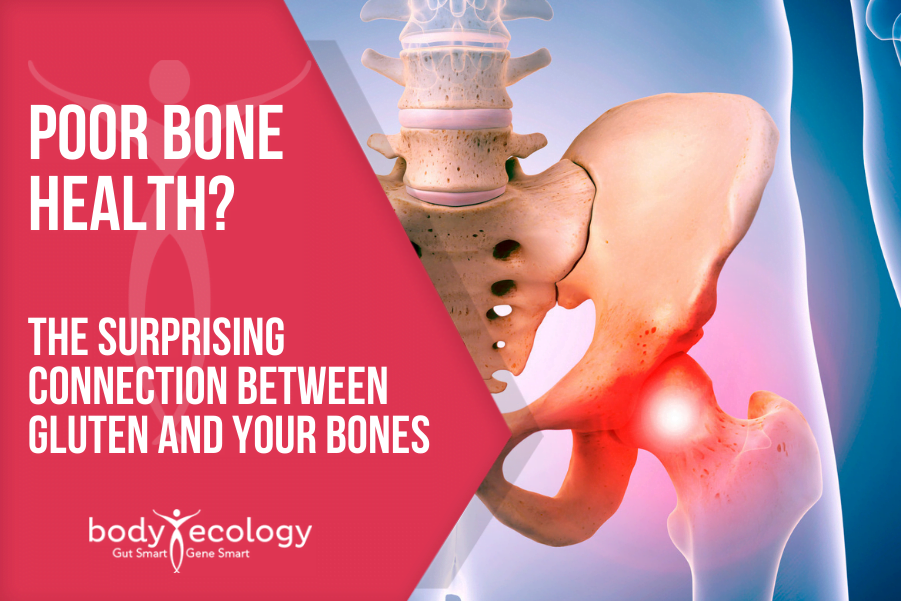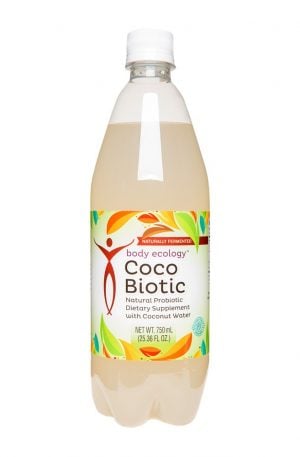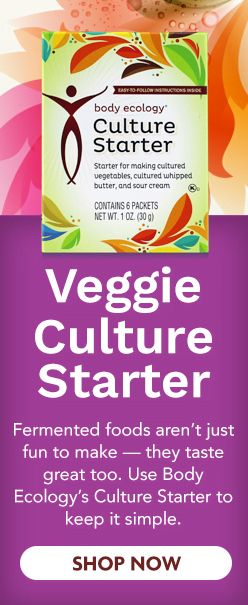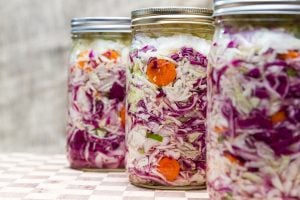The Surprising Connection Between Celiac Disease/Gluten Intolerance & Poor Bone Health

If you have celiac disease, you might be surprised to learn that you have a 69% increased risk of hip fracture.¹
That’s right. Celiac and gluten intolerance symptoms don’t stop with digestive distress.
And while most people are aware that celiac is associated with the risk of developing additional autoimmune diseases and health conditions, the connection to poor bone health is relatively new.
Learn more about this connection and how probiotics may help restore and maintain better bone health.
Celiac Disease & Gluten Intolerance
Both celiac disease and gluten intolerance/sensitivity are caused by ingesting modern grain products that contain gluten. Gluten alters the barrier properties of the intestinal lining, which increases permeability.¹ When combined with other factors, such as an imbalance of good and bad bacteria in the gut, antibiotic use, and inflammation, the result can be a ‘leaky gut.’
With celiac disease, the immune system identifies the gluten as an enemy and attacks it while in the small intestine. These attacks have the unfortunate effect of damaging the tiny villi in the small intestine, the small fingerlike projections that promote nutrient absorption.
Both gluten intolerance and celiac disease can have similar digestive symptoms, including bloating, gas, diarrhea, constipation, and more. The only solution is a strict gluten-free diet that includes prebiotic and probiotic rich foods to restore beneficial microflora to the gut to reduce inflammation and promote healing.
The Gluten & Bone Health Connection
There are two primary connections between gluten and poor bone health.
Nutrient Malabsorption – Because gluten damages villi in the small intestine, key nutrients for bone health – such as calcium, vitamin D, and vitamin A – cannot be properly absorbed. So even if people with celiac and gluten intolerance are eating plenty of food with vitamins and minerals needed for bone health – plus taking supplements – those nutrients aren’t getting to the bones in adequate amounts.
This problem is compounded because wheat and gluten containing grains, such as wheat and barley, contain phytic acid. Phytic acid further inhibits the absorption of minerals and can deplete the body of minerals when consumed often. Grains and other foods high in phytic acid must be soaked, sprouted, or fermented to reduce the amount of phytates.
For calcium, in particular, not getting it to the bones where it’s needed can lead to other, more dangerous conditions. In the bones, calcium is key for preventing osteoporosis and fractures. But in the blood, too much calcium can lead to calcification of arteries and heart disease.
Inflammation – A leaky gut caused by gluten can lead to systemic inflammation. This is because when the gut mucosal layer is permeable, it allows opportunistic microorganisms like bacteria, parasites, and viruses, food particles, and other molecules to leave the intestines and enter the body.
This signals the immune system to release cytokines that tell the body to attack. As the body responds to the foreign invaders, it creates an inflammatory response that dilates blood vessels while also releasing white blood cells. When a leaky gut goes unhealed, the body is in a constant state of inflammation. Chronic inflammation caused by any condition associates bone loss.³
Probiotics: How To Restore & Maintain Bone Health
Since the connection between gluten and poor bone health starts in the gut, a healthy gut is priority one. A strict gluten-free diet is the first step, but avoiding gluten alone isn’t enough for most people.
Introducing beneficial microflora to the gut in the form of fermented foods and probiotics can reduce inflammation and promote healing of the intestines. And healthy, properly functioning intestines and reduced inflammation are key to absorbing and routing nutrients to the bones.
New research has also found that probiotics are just as important to bone health as calcium and vitamin D,⁴ and that they may even reduce osteoporosis levels in older women.⁵
Because celiac disease and leaky gut causes inflammation, people with these conditions may have weakened immune systems and be more susceptible to infections that may require antibiotics. While antibiotics are life-saving necessities in some cases, they have the unfortunate effect of killing both the good and bad bacteria in the gut. The probiotic, lactobacillus plantarum has been found to be resistant to antibiotics, and is often given to patients in ICUs on antibiotics.⁶ This makes it the ideal probiotic for anyone to take on antibiotics.
 You can get this beneficial bacteria through probiotic liquids and effective probiotic supplements. The Body Ecology system of health and healing also recommends supporting bone health by consuming fermented foods every day. While you can buy fermented foods at the grocery store, it’s actually very easy to make them at home. One of the products used in making fermented foods at home, EcoBloom, is natural inulin from chicory powder extract. This inulin is used in place of sugar in making fermented foods, serving as a prebiotic that ‘feeds’ the probiotics and helps them multiply more rapidly. In addition to being a prebiotic, inulin has the added benefit of supporting calcium absorption and total body bone mineral content/density.⁷
You can get this beneficial bacteria through probiotic liquids and effective probiotic supplements. The Body Ecology system of health and healing also recommends supporting bone health by consuming fermented foods every day. While you can buy fermented foods at the grocery store, it’s actually very easy to make them at home. One of the products used in making fermented foods at home, EcoBloom, is natural inulin from chicory powder extract. This inulin is used in place of sugar in making fermented foods, serving as a prebiotic that ‘feeds’ the probiotics and helps them multiply more rapidly. In addition to being a prebiotic, inulin has the added benefit of supporting calcium absorption and total body bone mineral content/density.⁷
How To Make Cultured Vegetables At Home With Body Ecology
Get on the road to better gut and bone health by whipping up a batch of delicious and nutritious fermented vegetables at home. Enjoy ½ cup of fermented veggies with meals, and don’t leave that valuable ‘liquid gold’ in the jar! You can drink the liquids left behind in your cultured veggie jar, or add it to your homemade salad dressings or smoothies.
Here’s how to make cultured veggies at home:
Start with Body Ecology Veggie Culture Starter and EcoBloom
 To Use Body Ecology’s Culture Starter:
To Use Body Ecology’s Culture Starter:
Dissolve one or two packages of Starter Culture in 1⁄2 cup warm (90º F) water. Add 1 Tbsp. of EcoBloom.™ Let Starter/EcoBloom™ mixture sit for about 20 minutes or longer while the L. Plantarum and other beneficial bacteria wake up and begin enjoying the EcoBloom.™ Add this Starter Culture to the brine (step 3 in the recipe below).
VERSION 1
3 heads green cabbage, shredded in a food processor
1 bunch kale, chopped by hand
(optional): 2 cups wakame ocean vegetables (measured after soaking),
drained, spine removed, and chopped
1 Tbsp. dill seed
2 heaping Tbsp. of Celtic Sea Salt
VERSION 2
3 heads green cabbage, shredded in a food processor
6 carrots, large, shredded in a food processor
3 inch piece ginger, peeled and chopped
6 cloves garlic, peeled and chopped
To Make Cultured Vegetables
- Combine all ingredients in a large bowl.
- Remove several cups of this mixture and put into a blender.
- Add enough filtered water to make a “brine” the consistency of a thick juice. Blend well and then add brine back into first mixture. Stir well.
- Pack mixture down into a 11⁄2 quart glass or stainless steel container. Use your fist, a wooden dowel, or a potato masher to pack veggies tightly.
- Fill container almost full, but leave about 2 inches of room at the top for veggies to expand.
- Roll up several cabbage leaves into a tight “log” and place them on top to fill the remaining 2 inch space. Clamp jar closed.
- Let veggies sit at about a 70ºF room temperature for at least three days.
A week is even better. Refrigerate to slow down fermentation. Enjoy!

References:
1 https://academic.oup.com/jcem/article/100/1/25/2812702
2 https://www.ncbi.nlm.nih.gov/pmc/articles/PMC6835310/
3 https://pubmed.ncbi.nlm.nih.gov/19443863/
4 https://pubmed.ncbi.nlm.nih.gov/32285249/
5 https://www.figo.org/news/probiotics-reduce-osteoporosis-levels-older-women








